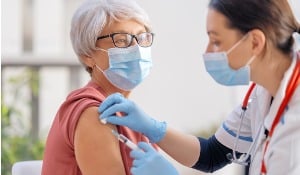The COVID-19 crisis isn’t over. A second booster shot will help even older adults who’ve had the virus protect themselves from hospitalization or death.
While COVID-19 is less and less in the news, the reality is that the pandemic is just as deadly as it was in its early days. The U.S. is still averaging more than 30,000 new cases and hundreds of deaths every day as of mid-April, the same pace as in March 2020. People still need to be diligent about protecting themselves—especially older adults who are more at risk.
That starts with getting vaccinated. A second COVID booster is now available for adults 50 and older who received three previous doses if it’s been at least four months since their first booster shot.
As more people catch mild cases of COVID, the idea of a fourth vaccination shot may seem unnecessary. Dr. Geraldine Luna, Chicago’s deputy commissioner of public health, said the booster shot helps cells remember how to fight the virus and prepares the body for a strong response.
“It’s so important in the aging population—65 and older, 50 and over with chronic conditions or even younger than that if they have a weakened immune condition,” Luna said. “As we face Omicron and other mutations of COVID-19, we know that response decreases a little bit over time, and these boosters ‘boost’ back that immunity memory.”
The Myth of Natural Immunity
The vaccines have proven power in limiting diseases, hospitalizations and deaths, even with the more contagious BA.2 variant. “Even though it’s not as severe as other variants, in our most frail population [the BA.2 infection] can progress significantly and very quickly into severe phases of the disease, requiring the individual to be hospitalized—and perhaps progress even further to death. Protection is everything at this point.”
People who have tested positive for COVID in the past don’t have natural immunity and can catch it again. After recovering from COVID-19, most people will have some protection from repeat infections, but they do occur and people need to continue to be diligent with their vaccinations.
While 82% of the U.S. population have taken at least one vaccine, in many places the numbers are much lower and no one knows what percentage will keep COVID-19 at bay going forward. “However, we know that a significant portion of our elders are not vaccinated or they’re lagging in getting their second dose or have not had their first booster—when we’re already moving to this all-important second booster,” Luna said.
Drugs for Treatment
For older adults who do test positive for COVID, there are now drugs that can help. Paxlovid, the latest pill for treating COVID cases, cut hospitalization and death 89% in its clinical trials.
“Therapeutics are very effective for those that are very at risk or vulnerable to severe outcomes of the disease,” Luna said. “You just need to be 65 years and over to get it if you are eligible, meaning you are not taking other drugs that might impede or might be counter-effective.”
The federal government launched the Test to Treat initiative, allowing people to get tested and have prescriptions filled in one location on the same day. That’s important because it’s recommended these medications be taken within the first five days after showing symptoms.
Keep in mind, these drugs should not be a replacement for the vaccine.
A Next COVID Wave?
COVID has taken so many twists and turns, that no one can say for sure what’s next. During the July 2021 drop-off in cases, when people thought it was over, Delta and Omicron were right around the corner and would push cases to new highs.
“The most powerful thing we can do is to be completely vaccinated,” Luna said. “Aging itself puts you at risk of suffering from severe presentation of COVID-19 and death related to this virus, as well as other viruses.”
There’s been so much emphasis on the COVID vaccines that some seniors have put off getting their annual flu shot or shingles and pneumococcal vaccines. People need to be vigilant about keeping up with all preventative options.
The COVID vaccine is free to Medicare beneficiaries and widely available. The U.S. has the highest quality of vaccines in the world. So nothing should be getting in the way of older adults getting all four recommended doses.




